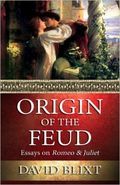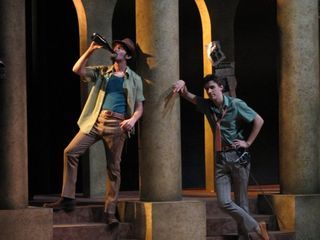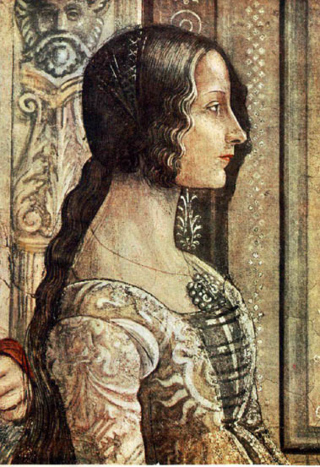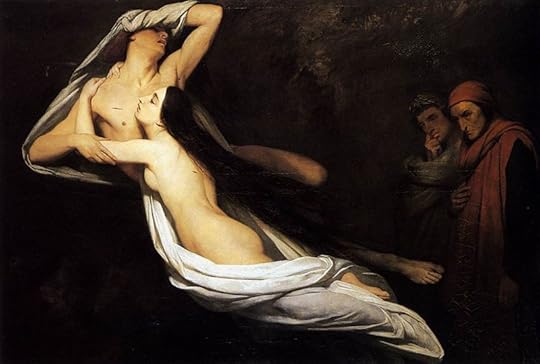David Blixt's Blog, page 4
February 9, 2016
Letters to Juliet
I know there are desperate people in the world, seeking advice on how to live their lives. Dear Abby, Oprah, and Mr. Blue (oh, how I do miss Mr. Blue!) are only a few examples of how authority figures have hundreds, even thousands of people seeking their counsel. I have absolutely no issue with this, nor really a comment to voice. Find help where you can.
But there are some who don���t quite know where to turn. When she was younger, my wife Janice worked as a receptionist at a television station. On her first day she was told job was to "cull the real calls from the crazies". She was confused by those instructions until she fielded a call on her first day from a woman who had burned her hand and wanted to talk to Dr. Quinn, Medicine Woman for help.
I suppose I have less of a problem with asking for a fictional character than with the choice of fictional character ��� wouldn���t she rather talk to Dr. Ross or Dr. Carter? Or even the guys from MASH? Someone with a passing knowledge of modern medicine at least? Not to knock Dr. Quinn ��� I���ve met Jane Seymour and she���s absolutely lovely. But seriously!
Which, in a roundabout way, brings us to the topic of people writing letters to Juliet. It���s been happening for several hundred years. The lovelorn, for the most part, writing to her for help. Two authors complied a book of letters written to Juliet in Verona, and the answers sent by the club set up just for that purpose. This was the book Letters To Juliet, which spawned the film of the same name. Again, kudos.
What I cannot for the life of me fathom is this ��� why are these people writing to Juliet? Why go to her of all people for help?
There are three distinct problems with their choice of advisor, which I will list in ascending order:
1 - She is a fictional character.
2 - She���s a dead fictional character.
3 - Seeing how she���s dead because of her love-life, why would anyone want her advice in the first place? Her love affair didn���t go so well.
So there it is, my frustration with people not thinking through their need for a guide in life. I have less trouble with Linus writing to the Great Pumpkin than I do with people writing to a fictional dead fourteen year-old.
I mean, really ��� who asks love advice from a fourteen year-old?
 (For more essays and insights on Shakespeare's Romeo & Juliet, download ORIGIN OF THE FEUD - just $1.99! Exclusively on Amazon Kindle)
(For more essays and insights on Shakespeare's Romeo & Juliet, download ORIGIN OF THE FEUD - just $1.99! Exclusively on Amazon Kindle)
February 8, 2016
Cut the Prologue
I never enjoy productions of Romeo & Juliet that play the Tragedy from the beginning ��� probably because I don���t think it is a Tragedy at all (see here). But even if it were, this isn���t Hamlet or Macbeth. There���s no ghost, no three witches. The first half of the show is really, really funny. If you play the Tragic elements of the show from the get-go, the show becomes a dirge. Whereas if you play it as written, as an Italian Comedy, it moves right along.
 Wait, you ask. What about the Prologue?
Wait, you ask. What about the Prologue?
Screw the Prologue, say I.
I don���t care how famous it is. I think the famous Prologue is tacked on, a later addition. It doesn���t appear in the First Folio. In the earliest texts we have, the show begins with two guys walking down the street talking about sex and violence: I will push Montague���s men from the wall, and thrust his maids to the wall. The Prologue only serves to make the audience brace themselves, hold themselves in emotional reserve.
Read the Prologue again:
Two households, both alike in dignity,
In fair Verona, where we lay our scene,
From ancient grudge break to new mutiny,
Where civil blood makes civil hands unclean.
From forth the fatal loins of these two foes
A pair of star-cross���d lovers take their life;
Whose misadventured piteous overthrows
Do with their death bury their parents��� strife.
The fearful passage of their death-mark���d love,
And the continuance of their parents��� rage,
Which, but their children���s end, nought could remove,
Is now the two hours��� traffic of our stage;
The which if you with patient ears attend,
What here shall miss, our toil shall strive to mend.
What the hell? Telling everyone at the top what the end is going to be? No self-respecting playwright would do such a thing! Shakespeare was a big believer in the old maxim Show, Don���t Tell. It can���t be there to explain the feud, because that���s explored right off the bat by Sampson and Gregory. It can���t be there to establish the location, because the Prince says Verona several times in his opening speech.
No, the only vital purpose the Prologue serves is as a disclaimer, a warning: Don���t laugh too much, folks, because they���re gonna die. See you at the end!
Shakespeare didn���t think much of Prologues. The only other times I can think of that he used them was in Troilus & Cressida, where he was aping the Greek style, and in Henry V, where he was making a political statement at the top of each act.
Why use it in R&J, then? Because this show could have gotten him lynched. Imagine if the disclaimer wasn���t there. The audience is laughing at the nurse, smiling at the familiar banter of the lovers, enjoying the light-hearted swordplay. Then, snap, someone���s dead. Then another person is dead. Then weeping and wailing and gnashing of teeth. Then, oh look, they���re going to be fine ��� what, they���re dead?!
So the Prologue is a warning to the audience to keep the players from being beaten to death after the show by an angry mob. The author of the Prologue even felt the need to repeat it! Just before the balcony scene the Prologue returns to remind everyone:
Now old desire doth in his death-bed lie,
And young affection gapes to be his heir;
That fair for which love groan���d for and would die,
With tender Juliet match���d, is now not fair.
Now Romeo is beloved and loves again,
Alike bewitched by the charm of looks,
But to his foe supposed he must complain,
And she steal love���s sweet bait from fearful hooks:
Being held a foe, he may not have access
To breathe such vows as lovers use to swear;
And she as much in love, her means much less
To meet her new-beloved any where:
But passion lends them power, time means, to meet
Tempering extremities with extreme sweet.
Death-bed? Gapes? Bewitched? Not the most romantic of language. Glad you���re enjoying the show, folks, but they���re still gonna snuff it! But enjoy watching them hook up, and see you at the end!
Which is why I cut the Prologue whenever I direct the show. It serves no useful purpose, gives no information we don���t get elsewhere, and undercuts the power of the story right out the gate.
February 7, 2016
The Tragedy of Romeo & Juliet?
I venture into the realm of the painfully obvious when I say that, since it was first penned somewhere around 1595, Shakespeare���s Romeo & Juliet has become timeless. As an actor, it���s been my good fortune to perform most of the male roles in the show ��� Romeo, Tybalt, Lord Capulet, the Friar, Lord Montague. But the role I���ve been called back to most often, the first part I ever took up, is Mercutio. It���s through his eyes that I first started to understand the play as a whole. And over time and many, many productions I began to think that all the various directors, with all due respect, had missed the boat.
Because The Tragedy of Romeo and Juliet is not a Tragedy at all.
A Shakespearean Tragedy (or Aristotelian, if you���re being picky) revolves around a single strong central male figure who is a paragon of virtues, the best at everything a man can be: lover, poet, politician, warrior, philosopher ��� but who has one tragic flaw that leads to his ultimate destruction. With Macbeth it���s Ambition, with Othello it���s Jealousy, and so on.
That definition doesn���t apply to the leading man in R&J. At the start of the show Romeo���s locking himself in a dark room during the day, then wandering the edge of the forest at night, composing love odes to Rosaline, who is going to become a nun. Romeo is a prat.
I was in rehearsals for As You Like It, playing Oliver, when I watched the scene of Orlando running around the forest posting those god-awful poems to a different Rosalind and suddenly realized, Oh. It���s Romeo. Fortunately for us all, Romeo is much cleverer than Orlando, but the core character is the same. Romeo is not Hamlet or Macbeth or Othello. He���s Orlando, Claudio, Orsino. He���s a Comedic lover.
With that in mind, I started thinking of all the elements of a Shakespearean Comedy. I���m of the opinion the best of his Comedies is Twelfth Night. It has everything: lovesick man loving the wrong woman only to discover true love; smart, capable young woman in dire circumstances; clowns; disguises; musicians; mistimings; twins; shipwrecks; and a woman disguised as a man.
So I began comparing that list to R&J :
Lovesick fool ��� Romeo. Check.
Capable girl in dire circumstance ��� Juliet. Check.
Clowns - Mercutio, Nurse, Peter, Potpan, etc. Check.
Disguises - masked ball (though it���s only the boys who are crashing who show up in masks! It���s not a costume party, damn it!). Check.
Musicians ��� the oft cut but truly funny musicians who are present for the discovery of ���dead��� Juliet. Check.
Mistimings - Tybalt kills Mercutio by accident, Friar Lawrence���s message misses Romeo, Romeo kills himself just before Juliet wakes, etc. Check.
Secret wedding ��� Check.
Looking at that list, I realized that the only thing this Comedy lacks are twins, shipwrecks, and Juliet dressing as a man. In fact, the very same plan the Friar employs in Much Ado (���Let���s pretend she���s dead, and everything will be okay���) is used in R&J ��� except here it doesn���t work.
Oh, and R&J is missing one more element of a Comedy. A happy ending.
So Romeo & Juliet is not a Tragedy.
It���s a Comedy, gone horribly wrong.

Matt Andersen and Stephanie VanAlstine as Romeo & Juliet
When I talk about Romeo & Juliet, I like to compare it to the premiere of Snow White and the Seven Dwarves in 1937.
Bear with me here.
 Before the film was released, the newspapers called it ���Disney���s Folly.��� Walt was spending all his hard-earned Mickey Mouse money on a feature-length cartoon? Why? No one would sit through something like that. Kids didn���t have the patience, and adults didn���t care about dancing trees or whatever hokum he was putting in it. Besides, all that color on the screen, you���d go blind!
Before the film was released, the newspapers called it ���Disney���s Folly.��� Walt was spending all his hard-earned Mickey Mouse money on a feature-length cartoon? Why? No one would sit through something like that. Kids didn���t have the patience, and adults didn���t care about dancing trees or whatever hokum he was putting in it. Besides, all that color on the screen, you���d go blind!
But in December 1937 grown men and women left the premiere of the film weeping. The critics went nuts with praise. Every song became a top 10 hit. Fashion designers grew obsessed (Lucile Ball went to the Oscars that year in a Dopey hat). And theatre owners were forced to change seat-covers after every showing because of kids wetting themselves in terror and delight.
Why? Because no one had ever seen anything like it.
That���s what I think Romeo & Juliet was for the mid-1590s. The first half of the show is a typical Shakespearean Comedy, complete with sex jokes and idiot lovers. The show is funny. I mean, really funny. Read right, the balcony scene has a lot of truly comic elements.
In a normal show, like say Shrew, everything is revealed right after the secret wedding and everyone lives happily ever after. Here, however, the wedding is followed by the death of Mercutio, sending the play into a spiral to Hell.
The characters become trapped in an awful situation, trying to find a Comedic solution that isn���t there. It���s why the Nurse betrays Juliet���s trust. It���s why Capulet insists on a wedding. It���s not a mistake that the Friar���s plan is the exact same one that Friar Francis uses in Much Ado. It just goes horribly wrong.
At the center of this play is an oddball, the character who twists everything around and turns the play on its head ��� Mercutio, kinsman to the Prince. The best role Shakespeare ever wrote for a young man. All the best lines, a great psychedelic speech, a bawdy chase, a cool fight and an angry death, then backstage to drink and play cards until curtain-call.
His ���Queen Mab��� speech is a clue. Like the play, Mab starts out nice and airy and fun. Then in the middle, for no reason at all, it twists and becomes dark, the imagery grotesquely foreboding. It���s no coincidence that this speech is delivered by the person whose death will cause the same dark turn in the play.
Today we all know the story. But four hundred years ago, no one had ever seen anything like it. Shakespeare ripped the rug out from underneath his audience.
Romeo & Juliet is not a Tragedy. It is something much worse. Because first it makes you laugh. (For more essays and insights on Shakespeare's Romeo & Juliet, download ORIGIN OF THE FEUD - just $1.99! Exclusively on Amazon Kindle)
(For more essays and insights on Shakespeare's Romeo & Juliet, download ORIGIN OF THE FEUD - just $1.99! Exclusively on Amazon Kindle)
February 5, 2016
Loving Lady Montague
 Once upon a time, I had this nifty idea: explore the origin of the Capulet-Montague feud by placing it in the historical context for Shakespeare���s Romeo & Juliet. They were real families, after all, mentioned by Dante in the Divine Comedy. And based on a little-noticed line at the end of the play, I found a cause for the feud that spurred this whole series of books.
Once upon a time, I had this nifty idea: explore the origin of the Capulet-Montague feud by placing it in the historical context for Shakespeare���s Romeo & Juliet. They were real families, after all, mentioned by Dante in the Divine Comedy. And based on a little-noticed line at the end of the play, I found a cause for the feud that spurred this whole series of books.
The idea is this: Lady Montague is supposed to marry Lord Capulet, but elopes with Lord Montague instead. The deep friendship between Capulet (Capulletto) and Montague (Montecchio) is shattered, and the feud begins. Boom.
The unintended consequence of this was that I had to invent a character for Lady Montague, who has a mere two lines in the play. The servant Potpan has a more defined character than Romeo���s mother. Hell, unnamed musicians have more personality than she is given. So I had free reign.
I named her Gianozza, named for an early version of Juliet in Masuccio Salernitano���s 33rd Novel from Il Novellino. That story involves secret marriages, deaths of kinsmen, and a young groom fleeing to Alexandria. Because I was setting up a prequel to the famous story of star-crossed lovers, I liked the idea of using the names from that earlier version of R&J.
And somewhere along the line I ended up creating a character my readers love to hate.
Gianozza���s not evil. She���s not a schemer or a villain. Instead, in creating her character, I took her son���s main failing in the play and decided he learned it from her.
Gianozza���s in love with Love.
She���s especially fond of love poetry, and becomes fixated with the story of two doomed lovers Dante uses in The Inferno. She fails to notice that the lovers in question are in Hell. Instead she starts to idealize their doomed romance, with disastrous consequences. She aims to have a great love story just like theirs. And in so doing she sets up a great tragedy.
It all ties into the notion of Courtly Love, of love for love���s sake. Dante had his great love, Beatrice. She was not his wife. She was his muse. And when she died, he was able to love her completely, because his love wasn���t for the real Beatrice. It was for the idealized version of her.
Courtly Love is great for poetry. It���s just lousy for life.
In The Prince���s Doom we see Gianozza fifteen years after her marriage to Mariotto Montecchio. By now the marriage is strained. Not because her husband doesn���t love her. But because she���s no longer the center of attention. The only real attention she gets is from Antony Capulletto, still pining for her after all these years. Unconsciously, she stokes the feud, keeping it alive. There is a moment where Mariotto and Antony could reconcile, renew their friendship, end the feud. But Gianozza can���t help inserting herself once again, with disastrous consequences. Instead of burying the feud, she keeps them on the path that will end with them burying their children instead.
But she can���t help herself. She has defined herself through being loved by two men, men who are willing to fight and even die for her. She is the new Helen of Troy, the catalyst for great deeds. If she doesn���t have that, who is she?
A couple years ago Sean Graney adapted all the classic Greek dramas into a single day-long event which he entitled All Our Tragic. The title comes from a line that he gives to Clytemnestra: ���All our tragic happens because we love someone we shouldn���t have.���
Truer words were never spoken. Because the best drama doesn���t come from hate. It comes from love.
December 14, 2015
12 Apostoli - A Star-Cross'd Christmas Short
Verona, Italy
8
December, 1328
One of the favourite haunts of the Rakehells was a tavern with exquisite fare known as La Pentola ��� ���The Cookpot���. Through its narrow half-door and large interior portal were wide rooms with long polished tables that would quickly be heaped with delicious foods.
The story of its founding was made to amuse Cesco. One of the palace���s former cooks had departed in a fit of pique during that week when Cangrande had played at being dead and Mastino had the running of the palace. Insults to his person, the cook could have endured. But insults to his food, never. So, leaving his son to continue in the palace, Antonio Gioco departed in a fit of temper.
He did not travel far, just a few streets away, around the corner of the Piazza delle Erbe, to an inn with an invidious reputation that happened to be run by his wife���s cousin. And here Antonio began cooking furiously. Within weeks the place���s reputation had changed. It now drew monied but common folk, those who had never dined at the palace and wanted to taste creations invented for the Scaligeri.
No fool, the cousin-in-law, Mondadori, quickly altered the nature of his establishment. La Pentola was no longer a mere trader���s post and feeding trough for traveling merchants. The Cookpot was now a destination for travelers and locals wishing to eat noble foods.
Mondadori was afeared, after Cangrande���s miraculous resurrection, that his cousin���s husband would return to the palace. Certainly Cangrande asked. But it seemed the elder Gioco enjoyed being his own man, not tied to the vagaries of a lord���s whims.
Business got an even more impressive boost some months later. There was a dish Cangrande particularly favoured, based on Hebrew cuisine, a baked onion salad. Though the younger Gioco did his best, he could not recreate the dish as it had been made at the hands of his father. So one day, to the astonishment of those within and without, the Scaliger had strode into the inn, sat himself at a trestle table, and commanded a bowl of it.
From that moment onwards, La Pentola had to turn business away. Gioco introduced the people to Golden Morsels, those sugared bread delights that so fascinated the nobility. He offered lamb, duck, and boar in sauces that lingered in the memory, making the mouth water. He taught the trick of reversing a fish so the fat was rendered, leaving only the flavour. The costs of the spices and meats were huge, yes. But Mondadori was able to command magnificent sums ��� there was no price too high for someone wishing to eat as well as the Prince.
In three years, the place had undergone a transformation. It was now well-lit and clean (the latter allowing the former), and decorated with magnificently carved tables and stools of the darkest hue, so brown they were almost black. They had been able to pay for a new fa��ade, the banded red brick and cream marble that was so much the Veronese style.
It was still an inn, attracting all types. This last month it had been filled to bursting for the wedding of Verona���s heir, and the ongoing revelry had hardly slackened their demand. When the heir himself appeared this evening, carting a sack and looking for food for himself and his companions, Mondadori was hard-pressed to find space for them.
To his relief, Cesco grinned at him. ���While we wait, I���ll just pop into the kitchens and say hello to Antonio.��� And, his satchel over his shoulder, he vanished around the corner and down the stairs, into the kitchens built into the ancient Roman ruins beneath the building.
The rest of the young men (some of them not so young), stamped their feet free of snow and clapped their arms. It was an unusually cold winter, and the snow had come early and lay heavily over the ground. Most of the time you could just sweep the light dusting away. But not this year, when the Adige had a thin skein of ice across it and little children were able to fashion snowballs for the first time in their lives.
Clearly the Rakehells, as they were coming to be known, had spent the day in some active sport out-of-doors. They were covered in snow, blue of nose and red of cheek. Some Mondadori knew well ��� the Bonaventura twins, Petruchio and Hortensio; the Nogarola brothers Detto and Valentino; Cangrande���s bastard sons Bartolomeo and Ziliberto; and Prince Rupert, nephew of the Holy Roman Emperor, some of whose party were still lodged here.
Others he knew only by their reputations. Fabio Scolari and Yuri Castorani, the hawk and the bear, adult mercenaries in Verona���s employ, whiling away their winter sporting and cavorting with Verona���s heir. The little sour-faced blond lad was obviously the young Capulletto boy, Thibault, who so often sparred with his uncle. And the last pair were Paduan by their accents, and possibly the eldest after Yuri and Fabio. The red-haired one had to be Signor Benedick. Which made the other one with the calm voice, happy face, and liquid eyes Salvatore.
Cesco returned just as a table was cleared, the previous occupants chivvied to their rooms with an extra helping of wine. Still carrying his satchel, Cesco plopped himself down in the midst of the party and made idle talk until the wine, bread, and cheese had been served. ���Don���t be gluttons with the bread,��� he warned. ���I���ve seen what Gioco���s cooking tonight, and we may never move again.���
���This,��� barked Yuri, ���from a lad thin as a whippet.���
���That would be a fine name for him,��� agreed Fabio. ���Isn���t whippet a smallish breed of greyhound?���
���A bastardized breed,��� agreed Yuri.
���The bastard of a bastard,��� chortled Thibault.
Cesco snorted. ���That jest is so old, I wonder it hasn���t turned to vinegar.���
���Or piss,��� said Petruchio sourly.
���What���s that?���
���Oh, my dear brother was quite inventive. He discovered that if you take a platter outside in this weather and urinate into it, you will soon have a sheet of frozen urine.���
���That can be slid under locked doors,��� added Hortensio, chortling. His twin smacked him across the back of his head. There were gravely amused looks all around as everyone eyed the fellows they lived with suspiciously.
���Speaking of terrible ideas,��� said Salvatore, pointing, ���Ser Francesco, you should send that back to the kitchens. It���s gone bad.���
The loaf of bread he was indicating was dark and hard, less inviting than the flaky warm bread along the rest of the table. Cesco glanced at it, then drew it closer. ���It is dark as my heart, and somehow I will choke it down.��� He clapped his hands. ���Well, I'm certain you���re all desperate to know why I���ve asked you here. The fact of the matter is this ��� I have need of you all, my friends! The Capitano has deputed me to oversee the Christmas revels!���
���That���s like asking Lucifer to oversee a Christening,��� laughed Cesco���s half-brother Barto.
���Or a tart to run a nunnery,��� opined his other half-brother Berto.
���Two sides of a coin, those two,��� muttered young Petruchio.
���Obverse and Reverse,��� chortled his twin, Hortensio.
���Quiet, dunce, or they���ll use those names on us!���
���Speaking of coins, Obverse,��� said Cesco (Petruchio rolled his eyes heavenward), ���I���m to be given the dies for the minting of new coins. I���ve decided to have my own made. Any suggestions?���
They all bandied about ideas, roaring more loudly with each progressively foul suggestion. It was only when the image of a greyhound killing a hare while tupping a goat was floated that they had to rein in their creativity ��� because the food had arrived.
There was Apple Muse, boiled apples in almond milk and honey; there was a delicious platter of fawn-meat in a light applesauce; and a favourite of every true Veronese, boiled meats in Pear�� sauce. A thick winter dish combining day-old bread, butter, marrow from the osso buco bone, meat broth, cheese, nutmeg, and a heavy dose of black pepper.
In a season of feasts and revels, this was perhaps not the most lavish table set. But it was sumptuous, and the intimacy and simplicity of the place combined with the lack of ceremony to make it a thoroughly enjoyable meal.
���Better than anything you���d get at La Rosa Colta,��� said Detto softly.
Cesco arched an eyebrow his cousin���s way. ���Not anything.���
It would have been perfect left there, but several men had to add their wit, and there were many jokes about fish. Blushing, Detto deflected the jests by turning to Cesco. ���So, cos, what are these Christmas chores you need our help with?���
���Well first, I was thinking of decorating the Advent Sunday trees with these apples,��� said Cesco, dumping the contents of his satchel onto the long table. They were deeply red, hard and crisp to look at, and had the table not been replete with apple dishes already, they would have been devoured at once.
���What���s special about these apples?��� demanded Yuri suspiciously, lifting one.
���They���re magic apples,��� said Cesco. Everyone laughed, knowing the old joke. Detto blushed again. ���No, truly they���re from the Garden of Eden. One bite and you will have the knowledge of good and evil.���
Yuri stared at his, then slowly put it down. ���I do not trust you, I.���
���Aye?���
���Aye.���
Cesco grinned. ���With good cause.���
The moment the apple was still, it rattled and fell over. ���Jesus!��� cried Yuri, jumping backwards. The laughter was stifled by rattles coming from the rest of the apples, which were twitching and quivering on the table. One apple started to roll towards Prince Rupert, who speared it to the table with his knife. That stopped its approach, but not the rattle within. Noting the butt of the apple was not quite flush, he tugged at it. A beetle shot forth, darting off the edge of the table towards the shadowy back stairs.
���See?��� said Cesco lightly. ���The knowledge of Good and Evil. Good without, evil within.���
���Ser Francesco!��� cried Mondadori, blanching in dismay as he ran over to collect the other rattling apples. ���We cannot have beetles in the kitchen!���
���Oh come!��� retorted Cesco. ���Where do you think I got him?���
Several people in the inn eyed their dishes askance, unsure if he was joking. Mondadori rushed from one to the next, assuring them he was.
���Obverse! Reverse!��� Cesco snapped his fingers at the Bonaventura twins, who winced, realizing the names had stuck. ���I have a task that can only be performed by you.��� Their eyes became warily eager. ���I need you to sit down and recount, word for word, you parents��� best fights. I have a mind to pen a Nativity play, but with the Virgin and her husband as Kate and Petruchio.���
The table might have shattered into pieces, so loud was the roar of laughter that shook it. Embracing the task, the twins rose at once to portray the Saviour���s parents as their famously combative parents. Petruchio played his namesake, Hortensio their shrewish mother.
���If you don���t like the ass, woman, dismount, and I���ll take my ease! These boots are murdering me!���
���Good! I had them made just for that purpose. And I never said I didn���t like my mount.���
���You complained of the ass!���
���I was speaking of you!���
���You adore my ass.���
���Yes yes, the ass that launched a thousand ships. But though the ass is admirable, the ass that wears it is abominable. How much longer must I bear it.���
������Tis I that bears it.���
���My swollen belly proves you a liar.���
���Look, he said we may refuge in that manger.���
���I may refuse my refuge. A mangier manger there never was.���
���You���ll manage that manger, then, to make it less mangy.���
���Oh, I���m to clean, am I? What, is the divine child supposed to wait until I���m done tidying up?���
���Hardly! If he���s divine, he can pop out and help with the sweeping!���
���You mock his divinity?���
���Not at all. I mock myself for falling prey to such a tale. ���O, I love you, Guiseppe, I truly do. Don���t mind I���m pregnant. The baby belongs to the Lord.��� Which lord, I ask. Because if it���s that nobleman with the fancy camel up the road������
���I���d never fancy his camel as much as I fancy your ass, dear.���
Howls, tears, fists pounding the table. They carried on through the birth, responding as much to the heckling Rakehells as to each other. At last the Savior was born, portrayed by Cesco crawling out from between Hortensio���s legs and proclaiming, ���Here I am! Where are my gifts?���
Yuri, Fabio, and Salvatore played the three wise men, offering gifts of lint, dust, and spit. They sang scandalous versions of Jacopone da Todi���s Christmas rounds, shocking the ears of some other guests but gaining the approval of even more. They danced and cavorted, flapping their arms and clapping their hands, singing until their voices creaked and croaked.
���Bring me some water,��� cried Cesco, coughing from too much mirth. ���And in that fine glass vessel!���
Mondadori looked stricken. The Cookpot���s glass pitcher, made in the Holy Land, was a truly treasured piece. Yet he could not deny Verona���s heir.
He was relieved to see when he returned that the table was more ordered, with Cesco returned to his seat and the others gathered around.
���So, here I am, the Savior at table surrounded by my twelve closest friends. I seemed to have aged prematurely, leaping from birth to Last Supper in a single night. And I haven���t even performed any miracles!���
���Loaves and fishes!��� shouted Barto and Berto, still hungry.
���Not if we���re starting with that loaf,��� sneered Thibault, pointing at the untouched dark loaf beside Cesco.
���And wait until we���re at La Rosa Colta to multiply the fishes!��� added Yuri loudly.
���Are you planning to raise the dead?��� asked Salvatore.
���Or walk on water?��� snorted Rupert.
���No no. For my first miracle, I shall turn water to wine!���
���You mean wine to urine!��� shouted Benedick.
���We needn���t see you do it, though,��� added Thibault wryly.
Cesco plucked up a chunk of unbroken bread that had been sitting by him, untouched through the meal. He tore it in half over the clear pitcher, so that chunks of it fell to disturb the water. ���Take. Eat. This is my body������
���Then your body���s a corpse,��� mused Fabio, staring at the bread.
Cesco frowned. ���Fine.��� He dropped the butt of bread he was holding into the pitcher.
���If that���s your body,��� laughed young Petruchio, ���then you���re planning to walk on water after all!���
They were chortling and teasing when suddenly Berto shouted, ���Look!���
Amazed, the watching Rakehells saw the water turn cloudy, growing darker and darker until the liquid was unmistakably the colour of wine.
���Cesco, what did you���?���
���How did you���?���
���What in Heaven���s name���?���
Cesco waited for their amazed gasps and questions to end. Then he poured from the pitcher into each other their cups. ���This is my wine. You are my apostles.��� He gazed around at them. ���I wonder which of you will betray me.��� He let that linger for a time, then grinned. ���But until we find out, bottoms up!���
Some time later, after Cesco had made Benedick pay for the meal from a borrowed purse and everyone prepared to depart for their next bit of sport, Detto drew near his cousin. ���How did you do it?���
He would not answer anyone else. But for his childhood playmate, Cesco could not resist a teasing answer. ���How do you think?���
���It was the bread. But how?���
���Simplicity itself. Yesterday I soaked the bread in wine, then let it dry. When we arrived, I went downstairs and asked Gioco to help me set up my ���miracle���.���
Detto grinned. ���Well done. For a moment they were convinced. I think Thibault still is.���
Cesco laughed. ���He thinks I���m divine now, does he?���
���Infernal, more like.���
���Either will do.��� Shrugging, Cesco wrapped an arm about his cousin���s shoulders as the pair of them headed for the door. ���Thank Gioco, will you, Mondadori? And thanks for the use of your pitcher. It was ��� miraculous!���
Thinking the real miracle was that the glass vessel had survived, Mondadori waved them out. ���Glad to be of service, my lord. You and your twelve apostles are welcome any time.���
There was an unforeseen effect. The story spread swiftly that night ��� of the playacting, the singing, and the ���miracle���. Some recognized it for what it was, others scoffed or crossed themselves. But some believed. People began to come to the inn, hoping to find the twelve new apostles there.
Mondadori was a businessman. As with Gioco, he knew a good thing when he saw it. Within two days, he���d commissioned a new sign to hang above his door, effectively renaming his inn: 12 Apostoli.
For more Star-Cross'd shorts, pick up VARNISHED FACES, on sale December 22nd!
December 11, 2015
The Many New Varnished Faces
There are still a few stories being edited. A few titles may change, a few may be added. But as it stands, here is the Table Of Contents for the new edition of VARNISHED FACES:
A Poet's Nightmare - Part I
San Bonifacio's Curse
Illyria
The Daughters Of Venice
Varnished Faces
La Cittia Grossa
A Poet's Nightmare - Part II
Paradiso
Serenissima
De Monarchia
Lady In Waiting
The Hybla Bees
12 Apostoli
Illyria Lost
Heart's Ease
Desperate Pilot
A Poet's Nightmare - Part III
As I promised, a lot of new material to tide you over until CAPTIVE COLOURS (no, I haven't started writing it, I'm still researching, so simmer down, there's a lot of joy here).
Everything up to La Cittia Grossa takes place before or during THE MASTER OF VERONA. The various Nightmares and Paradiso all take place before VOICE OF THE FALCONER, while Serenissima takes place during it. De Monarchia, Lady In Waiting, and The Hybla Bees all occur during FORTUNE'S FOOL. And 12 Apostoli, Illyria Lost, Heart's Ease, and Desperate Pilot all take place during or after THE PRINCE'S DOOM.
That's right. Two of these take place immediately after what we know happened. We see both Pietro and Cesco again after the missed meeting on the quay in Venice.
Side note - one story has been re-titled, changing from The Shoemaker's Son to Illyria. My aim with the story changed as I resisted writing what I thought was the second part, only to write the perfect companion in Illyria Lost.
Strangely enough, Cangrande is largely absent from these stories. The great Scaliger is here relegated to the occasional mention, and one conversation in the dark of a cell. Perhaps this means I have said all I have to say of him. His tale is over.
But there are so many more to tell. I'm glad to have the opportunity here.
You can pre-order the print edition of VARNISHED FACES here. If you already bought the digital version, good news! All you have to do when the new edition is released is re-download your purchase, and all the new material will appear! My gift to you. 
December 10, 2015
'Varnished Faces' and so much more
 I've been hunkered down for weeks, scattered between four or five different writing projects. No, at least eight. Wait, that's not right - where am I? What day is it?
I've been hunkered down for weeks, scattered between four or five different writing projects. No, at least eight. Wait, that's not right - where am I? What day is it?
No matter. Because I'm surfacing to announce the arrival of a long-promised project as a little holiday treat. I'm about to release a print edition of VARNISHED FACES.
That's not all.
Something new has been added.
Several somethings, in fact.
Once upon a time (2007, to be accurate), I released two short stories via Amazon's old ebook model, before the advent of the Kindle (I know, ancient times). Those stories were San Bonifacio's Curse and Varnished Faces. One was expanded from a cut scene from THE MASTER OF VERONA. The other was entirely original, meant to fit in the gap of events as I leaped forward in time. They were fun, and under that model, I expected to do many more.
Then Kindle hit the scene, and the world altered. In 2012, a few months after the release of FORTUNE'S FOOL, I collected those two stories, added one more, and released them as a Kindle ebook.
It was never my intention to stop there.
Other books and plays have stolen my attention, but now, eight years after those first stories were released, I'm adding to them. Adding a lot. Nearly 20 stories in all.
At the end of the month I'll be releasing VARNISHED FACES in print for the first time, with all-new stories starring the whole Star-Cross'd cast: Mariotto gets a new piece, as do Lia and Katerina. Dante appears, as well as Giotto, Marco Polo, the Pope, and the Holy Roman Emperor. Shylock is there, and Benedick, Kate and Petruchio.
But more than anyone else, there are Pietro and Cesco. Pietro, young and off to see the world. Pietro, older and frantic as he attempts to pursue his foster-son into exile. Cesco, anguished over Dante's death. Cesco, in love. Cesco, fleeing forever.
I'll share one of these new stories here next week, a piece of mirth that suits the season.
In the meantime, click here to pre-order the new edition of VARNISHED FACES.
October 26, 2015
Theatrical Plagarism
���Lesser artists borrow; great artists steal.��� ��� Igor Stravinsky
A familiar quote, hilariously misattributed to Picasso by Steve Jobs.
But Stravinsky, ever the great artist, was himself stealing. The line actually belongs to T.S. Eliot:
"The immature poet imitates; the mature poet plagiarizes." ��� T.S. Eliot
But wait! The original construction belongs to W.H. Davenport Adams, and has a different tenor:
���That great poets imitate and improve, whereas small ones steal and spoil.��� ��� W.H. Davenport Adams
To me, it's the last one that rings truest. As an author, I borrow words all the time. I borrow great foibles, I borrow structure - hell, I borrow history itself. I borrow from peers and idols, I borrow madly. But never with the intention to imitate or build upon someone else's work. I borrow because I can then work with the borrowed bit to make it my own.
In theatre, we borrow all the time. ALL. THE. TIME. Concepts, lighting effects, costume ideas, accents, mannerisms, set pieces, hairstyles, music - all of it. The very words we utter are borrowed from the playwrights (though they, at least, get credit), and we bring as much of our own truth to those words, hopefully making them our own.
There is a line, however, where it stops being being imitation and improvement, and it begins to be theft and spoilage.
A few years back, I was part of the cast of a wonderful production of Twelfth Night at the Michigan Shakespeare Festival. It was one of those shows where everything worked: the concept-for-production completely gelled, the performers had a ball, audiences wept with laughter, and everyone leapt to their feet as we sang the closing song. A truly marvelous experience.
Just a year later, I read a review of another nearby theatre's production of the same show, which had taken not only the director's concepts of setting and style, but actually physically reproduced our set concept, and incorporated the use of tableaus and music in the same manner we had. I was annoyed. This was not imitation. This was theft.
There was nothing to be done. Nothing's gained by raising a fuss, save earning the kind of publicity that some people think helps but rarely does. It wouldn't have made anyone change their theatre habits, and no one likes the guy who yells at the umpire over a bad call. And as the plagiarists were part of a community theatre, it would be punching down.
Not to say professional theatre is immune from thieving. There are other (in)famous examples of theatrical 'appropriation' going the other direction, where a small theatre has a new concept for a classic show that then gets gobbled up by a big house, which is suddenly praised for its 'daring', ignoring the fact that it was the little guy being daring and the big guy reaping the profits.
This has been on my mind today, and I'm curious to where the line is. There are certain moments in well-directed plays that, once seen, defines the moment. Doing it any other way feels foolish. But then, if everyone starts doing that moment the same way, the surprise is gone, and it's time to shake things up with a new approach.
So where is that ever-elusive line? What is borrowing, and what is theft? Like crime, it is a matter of intent. Like pornography, I know it when I see it.
To me, theatre is the exploration of truth. Borrowing from others towards finding your own truth is part of the game. But stealing a whole show isn't your truth. It's someone else's.
(By the way, all the above quotes were stolen from this website. See for yourself)
June 24, 2015
HNS Preview IV - Biographies
The volume I put together for the HNS Conference in Denver this weekend has something that will hopefully make my fellow writer's hearts go pitter-pat. Not only is there a 150-page glossary. There are also biographies of all the major Fight Masters of the late Medieval, Renaissance, and Enlightenment periods, along with three pages of primary sources, listed chronologically.
Some of the biographies are lengthy, some brief, depending on the information I had at hand for each man. Here's an example of one of the longer entries:
Fabris, Salvator: (1544-1618) A celebrated Italian master of the late sixteenth and early seventeenth centuries whose work dealt entirely with the practical application of swordsmanship in the fencing school, the duel, and the brawl. Born in or around Padua, his youth coincided with the flowering of the Italian school of swordsmanship, with early Italian masters like Achille Marozzo, Angelo Viggiani and Giacomo di Grassi still teaching. He worked as a fencing master in Italy as well as in Northern Europe. After employment with an Archbishop, Salvator entered the service of the king of Denmark, Christian IV from 1601 to 1606. It was the King himself who sponsored the publication of the treatise, putting his court painter, Jan Halbeeck, as well as others like Valeggio (whose signature also appears in the book���s plates) at Fabris��� disposal to refine the drawings of the book���s handwritten edition. Fabris left the King���s employment in 1606, and after traveling across Europe, returned to Italy to teach at the University of Padua. His renown at its peak, young noblemen from all over Europe came to Padua to be taught by him. He died at the age of 74 after fighting against malignant fever. On his deathbed, he bestowed his salle to senior student Herman, a German, who was later assassinated by a jealous colleague by the name of Heinrich. The chief significance of Fabris��� treatise (1606) was the introduction and definition of the contra postura, as well as the definition and clarification of many previously half defined principles of fence, time, distance, circular parries and their deceptions, the disengagement, feints and opposition.
Have I whetted your appetites yet?
See you Friday!
HNS Preview III - Sword Parts - Rapier
 This is for Sam Hubbard, who rightly called me out for the last diagram I posted. It didn't do foible, mid blade, and forte, or true edge and false edge.
This is for Sam Hubbard, who rightly called me out for the last diagram I posted. It didn't do foible, mid blade, and forte, or true edge and false edge.
This is a diagram in the book I'll have available in Denver, exclusively for HNS members. I only made 50 of them, so I'm hoping I don't run out before everyone has theirs.
Excitement! See y'all soon!





